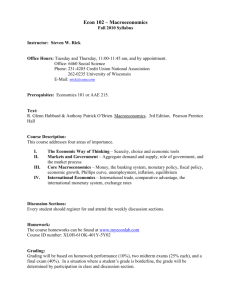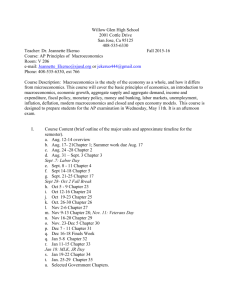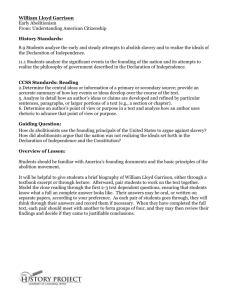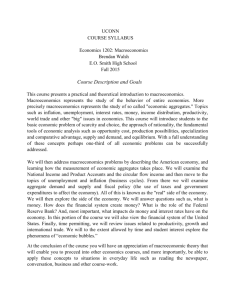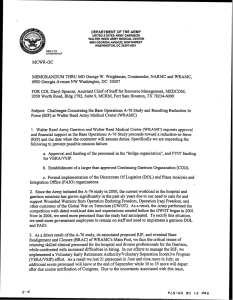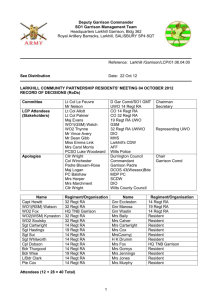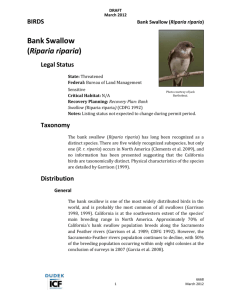Intermediate Macroeconomic Theory
advertisement
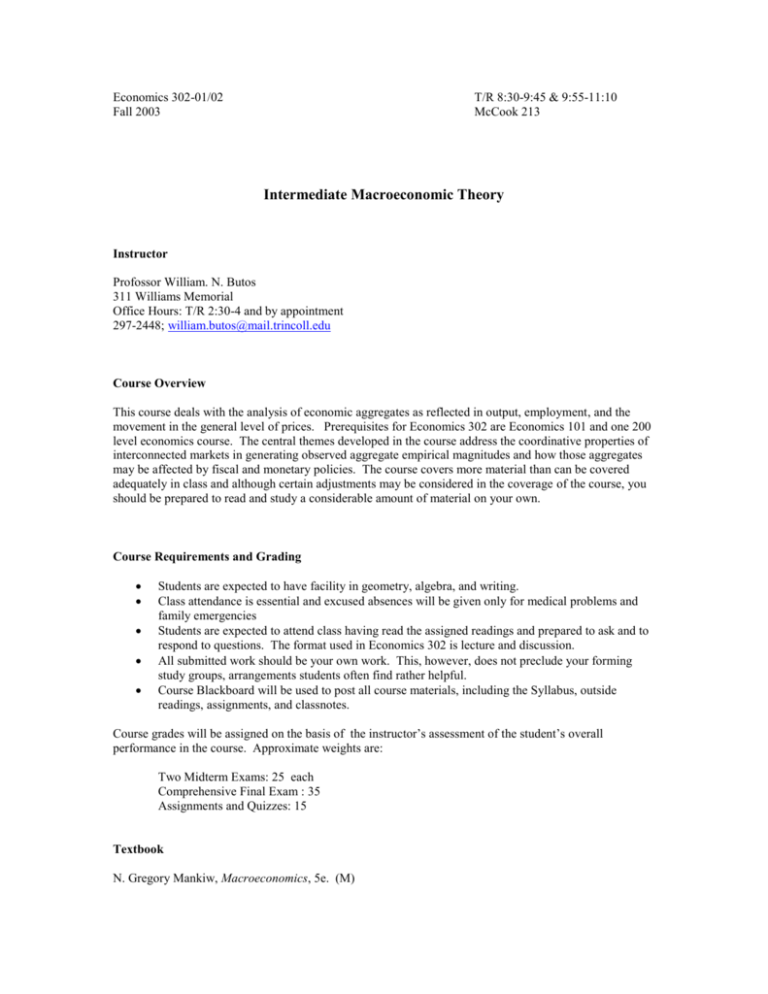
Economics 302-01/02 Fall 2003 T/R 8:30-9:45 & 9:55-11:10 McCook 213 Intermediate Macroeconomic Theory Instructor Profossor William. N. Butos 311 Williams Memorial Office Hours: T/R 2:30-4 and by appointment 297-2448; william.butos@mail.trincoll.edu Course Overview This course deals with the analysis of economic aggregates as reflected in output, employment, and the movement in the general level of prices. Prerequisites for Economics 302 are Economics 101 and one 200 level economics course. The central themes developed in the course address the coordinative properties of interconnected markets in generating observed aggregate empirical magnitudes and how those aggregates may be affected by fiscal and monetary policies. The course covers more material than can be covered adequately in class and although certain adjustments may be considered in the coverage of the course, you should be prepared to read and study a considerable amount of material on your own. Course Requirements and Grading Students are expected to have facility in geometry, algebra, and writing. Class attendance is essential and excused absences will be given only for medical problems and family emergencies Students are expected to attend class having read the assigned readings and prepared to ask and to respond to questions. The format used in Economics 302 is lecture and discussion. All submitted work should be your own work. This, however, does not preclude your forming study groups, arrangements students often find rather helpful. Course Blackboard will be used to post all course materials, including the Syllabus, outside readings, assignments, and classnotes. Course grades will be assigned on the basis of the instructor’s assessment of the student’s overall performance in the course. Approximate weights are: Two Midterm Exams: 25 each Comprehensive Final Exam : 35 Assignments and Quizzes: 15 Textbook N. Gregory Mankiw, Macroeconomics, 5e. (M) 2 Course Outline 1. Introduction M: 1, 2 Buchanan, “What Should Economists Do?” ch 1, What Should Economists Do? (1979) Hayek, “The Use of Knowledge in Society” American Econ. Rev. (Sept 19450 2. The Economy in the Long Run: The Determination of National Income M: 3 3. The Economy in the Long Run: Money and Inflation, The Open Economy & Unemployment M: 4, 18 (Section 1), 5, 6, 4. The Economy in the Short Run: The Keynesian Aggregate Demand Model & Aggregate Supply M: 9, 10, 16 (Sections 1, 3, 4), 11, 13 Keynes, The General Theoryof Employment, Interest and Money, Preface, chs 1, 3, 12 Yeager, “The Significance of Monetary Disequilibrium,” The Fluttering Veil (1997) 5. Capital-Based Macro Garrison, Time and Money: The Macroeconomics of Capital Structure, chs. 3, 4, Garrison, “The Austrian Theory: A Summary,” The Austrian Theory of the Trade Cycle (1996) 6. Issues in Stabilization Policy M: 14, Epilogue 3 Approximate Schedule Week Tuesday Thursday Sept 2, 4 Administration Introduction; M: 1 Sept 9, 11 The Data of Macroeconomics; M: 2 M: 2; Buchanan, Hayek Sept 16, 18 No Class Determination of National Income; M:3 Sept 23, 25 Quiz # 1; Money and Inflation; M: 4 M: 4, 18 (Section 1) Sept 30, Oct 2 The Open Economy; M: 5; Unemployment; M:6 Keynesian Aggregate Demand Model; M: 9 Oct 7, 9 No Class (Trinity Days) Exam # 1 Oct 14, 16 M:10 M: 10; Oct 21, 23 M: 11 Quiz # 2; M: 16 (Sections 1,3, 4) Oct 28, 30 M:11 M: 11; Keynes, The General Theory, Preface, chs. 1,3, Nov 4, 6 M:13; Capita-Based Macro; Garrison, ch 3 Nov 11,13 Keynes, The General Theory, ch 12; Yeager, “Monetary Disequilibrium”; Aggregate Supply; M: 13 Exam # 2 Nov 18, 20 Garrison, ch. 3, Garrison, ch. 3,4 Nov 25, 27 Garrison, ch. 4; Garrison, “The Austrian Theory” No Class (Thanksgiving Holiday) Dec 5, 7 Macro Policy; M: 14 Summing Up; M: Epilogue Capita-Based Macro; Garrison, ch 3 Comprehensive Final Exam: Dec 11 at 9am, Vernon Social Center
